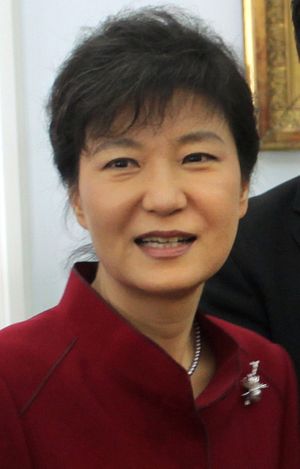South Korean President Park Geun-hye arrived in New Delhi Wednesday morning for a four-day state visit. Park will hold delegation level talks with Prime Minister Manmohan Singh on bilateral, regional and global issues, according to a press release by India’s Ministry of External Affairs.
Accompanying Park on her visit to India are South Korean foreign, trade, and science ministers. In addition to Prime Minister Singh, Park expects to meet President Pranab Mukherjee, Vice President Mohammad Hamid Ansari, External Affairs Minister Salman Khurshid and the Lok Sabha’s Opposition Leader Sushma Swaraj.
Relations between South Korea and India are warm and based on strong economic foundations, with bilateral trade exceeding $18 billion in 2012. India and South Korea additionally concluded a free trade agreement in 2009–the Comprehensive Economic Partnership Agreement (CEPA)–that will ensure that ties between Asia’s 3rd and 4th largest economies continue to increase.
Apart from commercial ties, India and South Korea enjoy a “strategic partnership.” President Park’s upcoming visit is expected to add depth to the bilateral relationship, which remains somewhat undercapitalized outside of economic matters. President Park and Prime Minister Singh will discuss broader cooperation between India and South Korea across a variety of fields including cooperation between their defense industries, space and nuclear technology, and cultural exchanges.
India’s Business Standard characterizes Parks trip to India as an effort in “sales diplomacy,” indicating that despite efforts to expand the character of the strategic partnership, the South Korean objective in India remains primarily commercial. South Korean firms have performed extraordinarily well in India. India’s generally restrictive investment climate for foreign investors is significantly relaxed for South Korean firms pursuant to the CEPA; South Korea firms are permitted to own stakes of up to 65 percent in Indian firms.
Park’s visit comes at an opportune time given that the Indian cabinet recently approved a special free-trade agreement between India and ASEAN that could see a breakthrough on the stagnant Regional Comprehensive Economic Partnership (RCEP) talks.
For its part, India sees South Korea as an important peg in its “Look East” policy and as an important partner on defense matters. South Korea and India, at their Foreign Policy and Security Dialogues in the past, have expressed interest in expanding defense cooperation. India additionally successfully concluded a civil nuclear cooperation agreement with South Korea which could lead to greater South Korean participation in India’s burgeoning nuclear energy market. India is currently pursuing a similar deal with Japan. India and South Korea additionally may broach the topic of maritime cooperation during Park’s visit.
India’s National Security Advisor Shivshankar Menon was in Seoul in July 2013 and broached the topic of intelligence sharing between South Korea and India to address nuclear proliferation activities in Pakistan and North Korea. India has generally refrained from taking a clear position on the many island disputes in Northeast Asia, notably the potentially explosive Senkaku/Diaoyu dispute between Japan and China, and the Dokdo/Takeshima dispute between South Korea and Japan.
President Park’s visit to India comes a little under two weeks ahead of Japanese Prime Minister Shinzo Abe’s scheduled visit to India as the guest of honor at India’s Republic Day celebrations in New Delhi. India takes great care in choosing its Republic Day chief guests; in 2010, India chose then-South Korean President Lee Myung-bak. New Delhi may have to play somewhat of a balancing act between South Korea and Japan as ties between the two Northeast Asian neighbors have grown frigid over the past year, particularly after Abe came to power in Japan. India also enjoys a robust and growing strategic partnership with Japan.

































